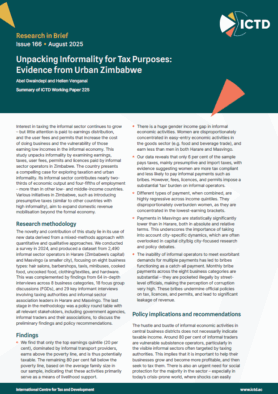Research in Brief 166
Interest in taxing the informal sector continues to grow – but little attention is paid to earnings distribution, and the user fees and permits that increase the cost of doing business and the vulnerability of those earning low incomes in the informal economy. This study unpacks informality by examining earnings, taxes, user fees, permits and licences paid by informal sector operators in Zimbabwe. The country presents a compelling case for exploring taxation and urban informality. Its informal sector contributes nearly two thirds of economic output and four-fifths of employment – more than in other low- and middle-income countries. Various initiatives in Zimbabwe, such as introducing presumptive taxes (similar to other countries with high informality), aim to expand domestic revenue mobilisation beyond the formal economy.
Summary of ICTD Working Paper 225.
